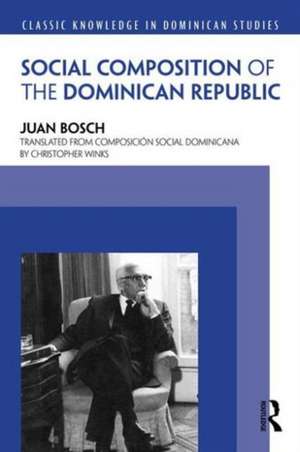Social Composition of the Dominican Republic: Classic Knowledge in Dominican Studies
Autor Juan Boschen Limba Engleză Paperback – 6 apr 2016
Juan Bosch, one of the most well-known and best-loved Dominican politicians and scholars, here sets out the important themes that define modern Dominican society. He tackles topics such as the inter-imperialist rivalry between France, Spain, England, and Holland and its subsequent impact on the Caribbean region, as well as the U.S. occupation of the Dominican Republic from 1916-1924. He also discusses the aftermath of political alliances between liberals and conservatives during the birth of the Dominican Republic, the Restoration War fought against the Spanish Crown, the role of the petit bourgeoisie and the hateros (cattle-ranchers) in the formation of a Dominican oligarchy, the emergence of dictator Rafael Trujillo, and the composition of society during his time in power.
This translation, introduced and contextualized by leading Dominican Studies scholar Wilfredo Lozano, opens up Bosch’s work for a new generation of scholars studying the Caribbean.
| Toate formatele și edițiile | Preț | Express |
|---|---|---|
| Paperback (1) | 488.33 lei 6-8 săpt. | |
| Taylor & Francis – 6 apr 2016 | 488.33 lei 6-8 săpt. | |
| Hardback (1) | 1057.09 lei 6-8 săpt. | |
| Taylor & Francis – 7 apr 2016 | 1057.09 lei 6-8 săpt. |
Preț: 488.33 lei
Nou
Puncte Express: 732
Preț estimativ în valută:
93.44€ • 97.76$ • 77.62£
93.44€ • 97.76$ • 77.62£
Carte tipărită la comandă
Livrare economică 03-17 aprilie
Preluare comenzi: 021 569.72.76
Specificații
ISBN-13: 9781138889835
ISBN-10: 1138889830
Pagini: 292
Dimensiuni: 152 x 229 x 15 mm
Greutate: 0.43 kg
Ediția:1
Editura: Taylor & Francis
Colecția Routledge
Seria Classic Knowledge in Dominican Studies
Locul publicării:Oxford, United Kingdom
ISBN-10: 1138889830
Pagini: 292
Dimensiuni: 152 x 229 x 15 mm
Greutate: 0.43 kg
Ediția:1
Editura: Taylor & Francis
Colecția Routledge
Seria Classic Knowledge in Dominican Studies
Locul publicării:Oxford, United Kingdom
Public țintă
Postgraduate and UndergraduateCuprins
1. Origin of Social Classes in Santo Domingo
2. The Emergence and Decline of a Sugar Oligarchy
3. From Sugar Mills to Cattle
4. Development of a Cattle Society
5. The Peculiar Buccaneer Society
6. Saint-Domingue: The French Colony
7. The Century of Misery
8. From Immobility in the 17th Century to the Dynamism of the 18th Century
9. Half a Century of Relative Economic Growthy
10. Santo Domingo within the Context of the Caribbean
11. The Haitian Revolution
12. The Case of Migration
13. The Government of Cattle-Ranchers and the Society of Tobaco Harvesters
14. Causes of the Haitian Invasion in 1822
15. The Petit Bourgeoisie in Dominican History
16. The Petit Bourgeoisie Opposes the Power of the Cattle Ranchers
17. 1857-1861: Struggles within the Petit Bourgeoisie
18. The Restoration: A Deed of the Petit Bourgeoisie
19. The Long-Lasting Reign of the Petit Bourgeoisie in Dominican National Politics
20. The Era's Social Composition and Political Parties
21. The Blue Regime or Toward the Bourgeois Society
22. From the Death of Heureaux to the Death of Caceres
23. Imperialism in Action
24. Social Composition through 1930
25. Trujillo or the Transition of the Petit Bourgeoisie to Bourgeoisie
26. Social Composition to the Death of Trujillo
2. The Emergence and Decline of a Sugar Oligarchy
3. From Sugar Mills to Cattle
4. Development of a Cattle Society
5. The Peculiar Buccaneer Society
6. Saint-Domingue: The French Colony
7. The Century of Misery
8. From Immobility in the 17th Century to the Dynamism of the 18th Century
9. Half a Century of Relative Economic Growthy
10. Santo Domingo within the Context of the Caribbean
11. The Haitian Revolution
12. The Case of Migration
13. The Government of Cattle-Ranchers and the Society of Tobaco Harvesters
14. Causes of the Haitian Invasion in 1822
15. The Petit Bourgeoisie in Dominican History
16. The Petit Bourgeoisie Opposes the Power of the Cattle Ranchers
17. 1857-1861: Struggles within the Petit Bourgeoisie
18. The Restoration: A Deed of the Petit Bourgeoisie
19. The Long-Lasting Reign of the Petit Bourgeoisie in Dominican National Politics
20. The Era's Social Composition and Political Parties
21. The Blue Regime or Toward the Bourgeois Society
22. From the Death of Heureaux to the Death of Caceres
23. Imperialism in Action
24. Social Composition through 1930
25. Trujillo or the Transition of the Petit Bourgeoisie to Bourgeoisie
26. Social Composition to the Death of Trujillo
Notă biografică
Juan Bosch, (1909-2001) the first democratically-elected president of the Dominican Republic, was a politician, historian, writer, and educator. Before his election, he led the exiled Dominican opposition against the dictator Rafael Trujillo. He is remembered as one of the most influential figures in Dominican politics and letters.
Recenzii
This excellent translation captures magnificently the superb qualities that combined to elevate Juan Bosch to the highest echelon of Caribbean intellectuals. He was enviably well-informed, incredibly thoughtful, uniquely insightful, powerfully articulate and zealously determined. His impressive command of the history of the Atlantic World rivaled his commanding knowledge of the Dominican Republic and that made Juan Bosch not only an extraordinary nationalist but also an outstanding Caribbean internationalist. This book, therefore, acutely addresses themes relevant to all the societies across the Americas.
-Franklin W. Knight, author of The Caribbean: The Genesis of a Fragmented Nationalism
Written in exile after a United States invasion put down a movement that sought to return the democratically elected Bosh to power, The Social Composition of the Dominican Republic is a fundamental primary source for understanding the history of Latin American social and political thought during the Cold War. Even four decades later it also remains an illuminating analysis of history, class relations, and the predicaments of modernization in the post-colonial Caribbean. This elegant English translation will introduce a new generation of students to Bosch, and to the long scope of Dominican history. Wilfredo Lozano’s excellent introduction offers a wide-ranging and accessible guide to the origins, impact, strengths, and weaknesses of the text.
-Jesse Hoffnung-Garskof, author of A Tale of Two Cities: Santo Domingo and New York after 1950
-Franklin W. Knight, author of The Caribbean: The Genesis of a Fragmented Nationalism
Written in exile after a United States invasion put down a movement that sought to return the democratically elected Bosh to power, The Social Composition of the Dominican Republic is a fundamental primary source for understanding the history of Latin American social and political thought during the Cold War. Even four decades later it also remains an illuminating analysis of history, class relations, and the predicaments of modernization in the post-colonial Caribbean. This elegant English translation will introduce a new generation of students to Bosch, and to the long scope of Dominican history. Wilfredo Lozano’s excellent introduction offers a wide-ranging and accessible guide to the origins, impact, strengths, and weaknesses of the text.
-Jesse Hoffnung-Garskof, author of A Tale of Two Cities: Santo Domingo and New York after 1950
Descriere
Social Composition of the Dominican Republic, first published in 1970 in Spanish and translated into English here for the first time, discusses the changing structure of social classes in Dominican society from the first encounter between Europeans and Natives through to the mid-20th century.













